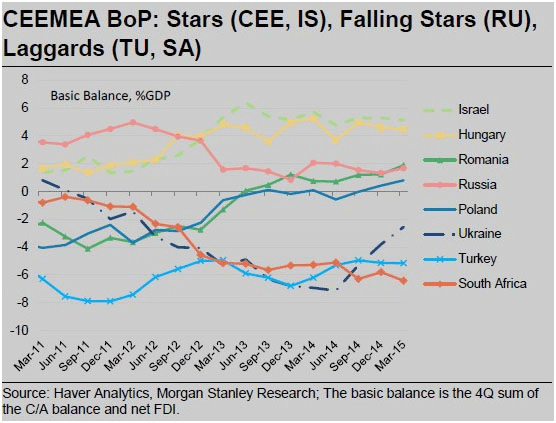Hungary is in a favorable position among emerging markets in the region, the latest analysis of Morgan Stanley finds.
The London-based economists of Morgan Stanley (MS) divided emerging markets into three categories based on their balance of payments. Countries of the CEEMEA region were classified as follows:

1. Stars. This group includes Israel and countries in the CEE region, where the external balance shows a surplus, the current account is improving structurally and there is little concern regarding the financing of the country. According to the analysis, the improved balance of these countries is largely due to lower oil prices, but Eastern European countries stand out in this respect and are considered a kind of safe haven with regard to financing. The report also highlighted that Hungary had the highest surplus, but Poland’s export performance was the most impressive.
2. Falling stars. The analysts put Russia in this group. The exchange rate of the ruble somewhat mitigates the impact of falling oil prices, but the real concern is the balance of payments, as capital outflow will exceed the current account surplus, which would decrease foreign exchange reserves.
3. Laggards. This group includes Turkey and South Africa, countries where the current account deficit has stubbornly stuck at high levels.
In their analysis, the economists of MS emphasize that the Eastern European region is in a very healthy position regarding balance of payments, mentioning in particular that Hungary’s external surplus equals 9% of its GDPm which is seen as a key change compared to the pre-crisis period.
Lending collapsed in these countries as a result of the financial crisis, which led to slower economic growth but at the same time made the growth model more sustainable, the analysts found.
The consumption boom is over, the era of cheap forex loans is gone and the property bubble has burst, but a competitive export sector and incorporation into the German supply chain acted to prop up growth. As a result, there has been no spectacular break in the region’s growth story, Morgan Stanley said.
Regarding Hungary, the analysts found that the upturn in the balance of payments was particularly spectacular and could primarily be explained by the improving trade balance. Although the actual trade balance has not improved since 2013 and even deteriorated due to improving domestic demand, this masks the favorable trade processes in the background. Hungary has a high external surplus, which helps it decrease its external debt.
It is Morgan Stanley’s expectation that once the deleveraging pressure on the bank system eases, Hungary’s balance of payments could be as a strong factor in the strengthening of the forint. In closing, the analysis states that CEE countries can be considered safe economies as they have undegone structural transformation sinve the global crisis began. |